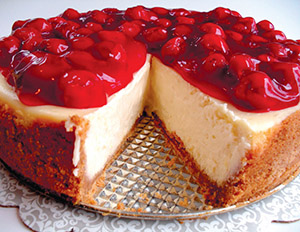
(Part I of IV)
Read part II of Homolka Hesitates here. Read part III here. Read Part IV here.
Mazel tov to JLNJ contributor Joe Rotenberg on “Homolka Hestitates” being chosen as a selection for the February edition of the Jewish Literary Journal.
Thomas Homolka was an artist of renown. His was not, however, the realm of oil and acrylics, watercolor and giclee. He couldn’t tell the difference between a symphony and a concerto; he knew nothing of architecture, sculpture or dancing. Homolka had a very special skill that few in his country could match. Thomas Homolka was simply the best cheesecake maker in Prague. His cakes were considered the best ever confected in the Czech capital, award-winners for multiple years in a row during the inter-war period. Homolka was particularly known for preparing the most intricate, multicolored cakes that were served in the finest homes on Wenceslas Square. Royalty demanded his cheesecake at state occasions, wealthy burghers stuffed themselves on his product; he even saw to it that every week, a “run” of inexpensive cheesecakes came out of his ovens on Anenska Street to help feed the less fortunate who craved his creations, if only once a week.
Homolka had few rivals who could match his skill and imagination. He mentored younger bakers whom he hoped could replace him one day; he had never married and so had no blood relative to take his place. At times this bothered him, but often he took so much joy from his work that he scarcely had a moment to be concerned about not having a visible successor. Homolka was a “hands-on” baker; despite his fame, he worked long hours daily at his store, seeing to it that every cake was prepared to perfection. In fact, he kept such long hours tending to his shop that, once, when he was invited by the mayor to see the famed Sparta Praha soccer team play in Letna Stadium, he notably fell asleep in his seat in the stands.
Baking cheesecakes on a commercial scale is not without difficulty. Homolka knew as did every great baker that it was imperative to avoid cracking and drying in the finished product and he took great pains to achieve perfection in the preparation and baking process. His attention to detail made him on occasion a difficult employer to work for. The result was worth the effort, he believed, and the 20 varieties that emerged from his ovens seemed to confirm his viewpoint.
As mentioned, Homolka’s customers were varied and came from all Czech classes. Of those, Homolka’s most reliable clients included some of Prague’s older residents, in particular, two sisters, blond Katya and brunette Magda Greenstein. Each week the sisters chose Friday afternoon to visit his store and Homolka liked to serve them personally if he could.
“Mr. Homolka,” Katya would ask in her soft voice, “have you any of your delicious cream cheesecake? My sister and I would just love some.”
Katya had been married for 10 years when her young physician husband was killed by a British artillery shell while defending the Empire in 1915. Now widowed for more than 20 years, her regular visits to Homolka’s were part of the weekly shopping routines that helped her keep her sanity, that allowed her to temporarily forget the pain and deep-felt loss of her husband those many tears before. Her sister Magda had also never married; she had moved into Katya’s spacious apartment upon the death of her brother-in-law. She accompanied Katya on her weekly visit to the bakery.
“And also your best chocolate cheesecake, please,” Magda added.
Homolka was always glad to accommodate these refined ladies, if he could. Though they always respectfully referred to him as “Mr. Homolka,” he felt comfortable calling them by their first names and so were they. There was a sweetness about them that was most endearing. Week after week he served them and over time their visits became part of Homolka’s routine. Once when he thought about it he realized he knew little about the sisters other than their cake preferences. One of the workers in his store knew them somewhat better:
“They live close to the Square, I believe, a couple of blocks to the south,” said Jan, the cashier. “They are Jewish, one is widowed, the other never married. They love our cheesecakes, I can tell you that! You can set your watch by their Friday visits,” he added.
Homolka nodded in agreement. “That you can!”
On one particular winter Friday, Homolka was helping in the store when the Greenstein sisters appeared. They were stocking up on baked goods apparently and ordered their regular favorites. When the time came to leave the store, Katya, burdened with more packages than she could handle, dropped several to the floor. Immediately, a tall, good-looking man with clear blue eyes who had been standing near her, jumped to attention.
“May I assist you, madam?” he said in accented Czech. Without waiting for a reply from Katya, the man bent at the waist, reached down and helped her rearrange her belongings so that they could be more easily carried.
“Thank you,” said Katya, “you are so very kind.”
“It is nothing, Madam,” he replied.
The man held the door to the store open so that the sisters could be on their way. Homolka recognized the good Samaritan as Heinrich Von Kleist, an Austrian Embassy attache, who was also a regular customer of his.
“Nice ladies,” Von Kleist said to no one in particular. “I see them here often.”
“Yes, indeed,” Homolka agreed. “Two of my most loyal customers. Jewish ladies. Very proper ladies.”
Von Kleists showed no immediate reaction to Homolka’s last comment about the Greensteins. Under his breath, however, Homolka thought he could hear Von Kleist say:
“Too bad!”
Read Part II of Homolka Hesitates next week in the Jewish Link.
By Joseph Rotenberg













